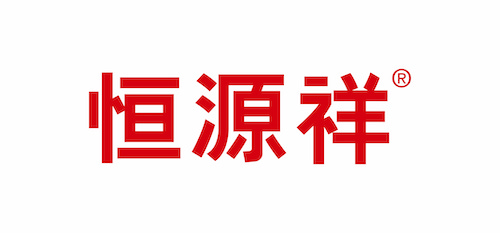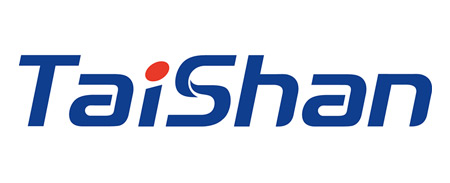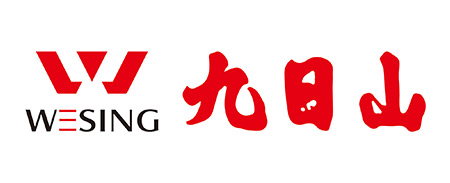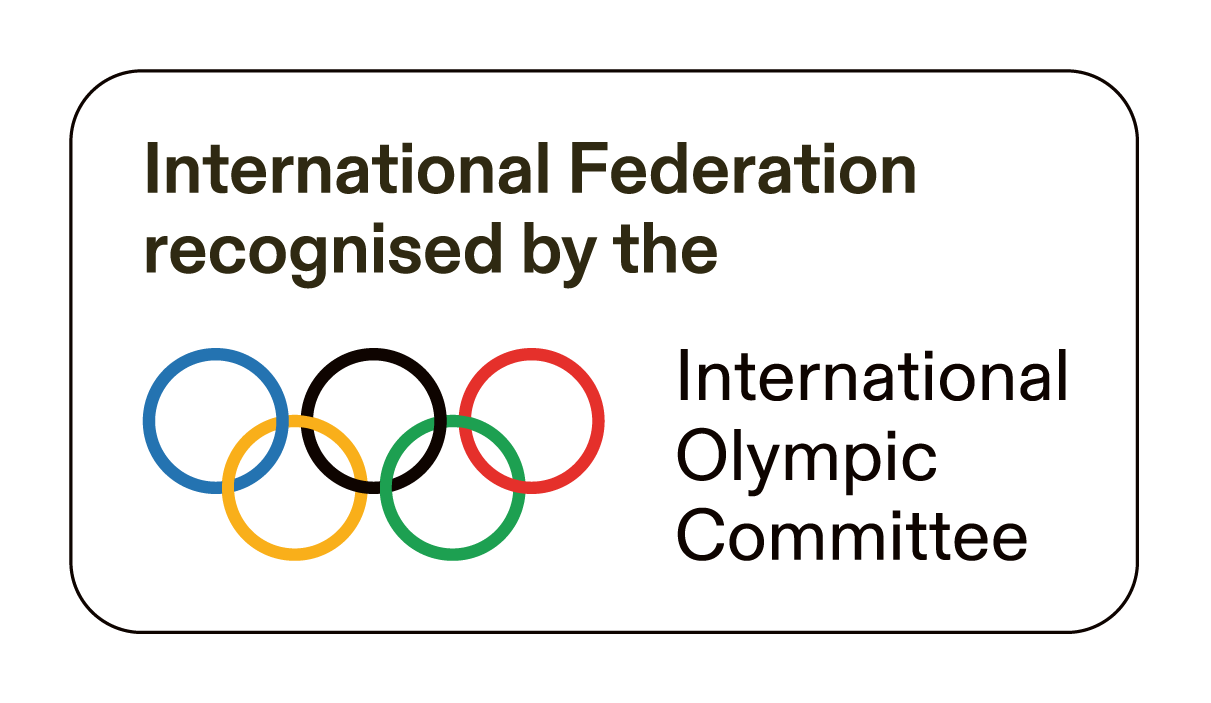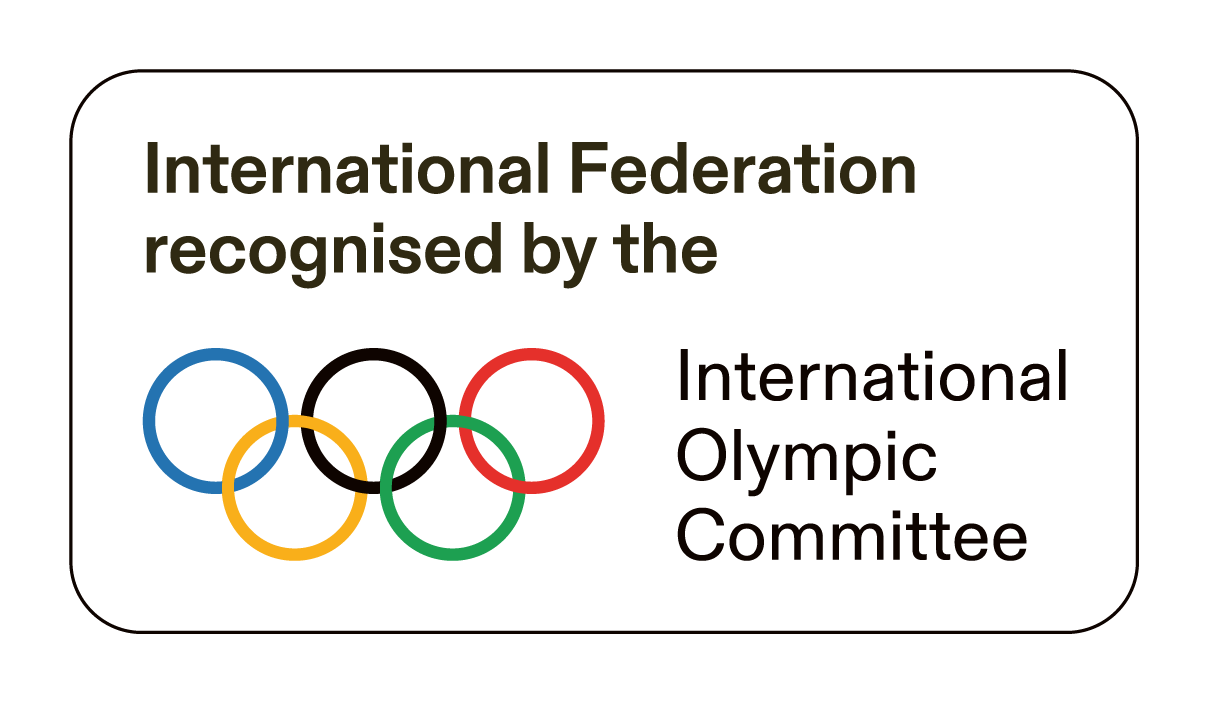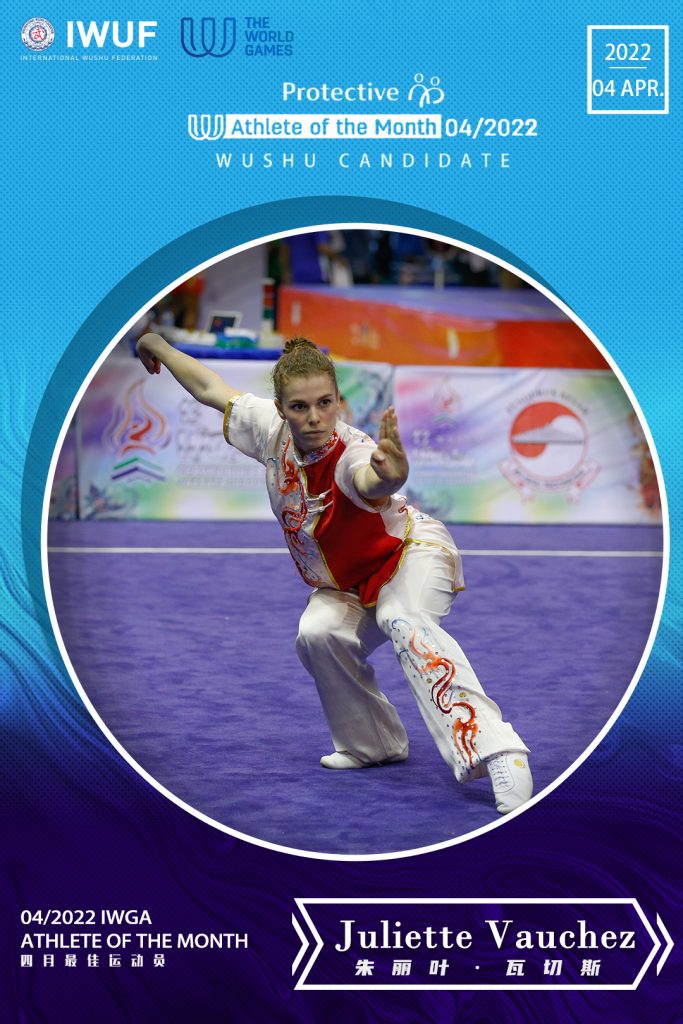
As a full member of the International World Games Association (IWGA), the International Wushu Federation recommended wushu athletes for the prestigious
IWGA Athlete of the Month award for the first time in April 2022. Finally, Juliette Vauchez, a female wushu athlete from France, has won IWGA Athlete of the Month for April, 2022..
Juliette Vauchez, 24, lives in Bordeaux in the South West of France, a region where wine is well known but wushu is not. However, that has not stopped this remarkable athlete from becoming a European champion and one of the most popular competitors on the international wushu circuit. Her strong work ethic, soulful performance, heartfelt sportsmanship, and deeply reflective philosophical approach to wushu demonstrates how abiding passion for one’s sport can truly change the life of a person forever. Juliette’s journey is still very much on the fast-track, and it will be a benchmark for French wushu when she becomes the first woman from France to qualify and compete in wushu in The World Games 2022 in Birmingham. Juliette Vauchez will compete in the discipline talou Chángquán, also known as “long fist” “.
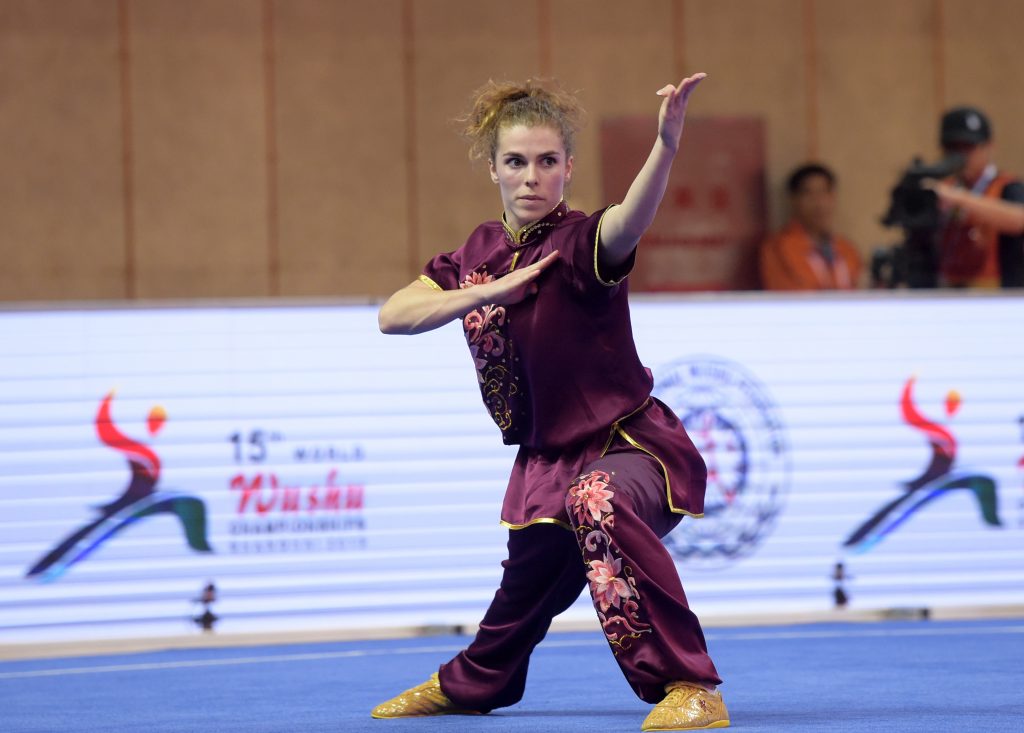
The International Wushu Federation has nominated Juliette Vauchez for the IWGA athlete award in April. One reason was that the Bordeaux athlete has qualified for the Birmingham Games this month. Another reason, she is one of the most popular competitors on the international Wushu circuit. Her strong work ethic, soulful performance, heartfelt sportsmanship, and deeply reflective philosophical approach to Wushu demonstrates how abiding passion for one’s sport can truly change the life of a person forever.
Let’e explore her full story as follows:
B ordeaux’s Best Vintage: Juliette Vauchez Explores the Inner Soul of Wushu
Juliette first discovered wushu in 2003, thanks to her father who loved the martial arts and had a friend practicing wushu in a club in Bordeaux. He suggested to Juliette, who was six at the time, that she try out wushu with his friend’s daughter. “After I started there I never left this club,” she recalls. “Later, I started competing and then teaching. Wushu is really a story that covers all my life!”
At the beginning there were no children’s classes and Juliette had to train with teenagers. “Later,” she says, “I was a little bit sad when I had to join the children’s lessons!” But from the beginning she remembers being focused, consistent and thorough in her wushu practice, even though her teacher was very strict. The discipline of training wushu suited her. “I guess I liked being confronted with complex movements,” she says. These were attributes that would shape her into the French champion she would become.
Growing up, Juliette found that contemporary sport wushu was considerably less popular than many other martial arts in Bordeaux, and that her club was unique. “When I started I was mainly inspired by my teachers, Mulan and Karate Kid movies. I don’t think wushu has ever been very popular in France,” she says. “In Bordeaux, there are several traditional kung-fu and taiji clubs but only a few offer wushu lessons. We try to make this sport grow in the city so we actually teach in two clubs and in four different sport centers to reach more people!”
Juliette started competing in earnest as a young teenager. “My very first competition was a team championship in May 2011 where a team of four of us had to perform a taolu set and we were ranked as one entity. I didn’t have ambition to compete at this time – I just liked training for myself – but my teacher wanted us to try so that we could challenge ourselves. I was quite happy with my performance even if I had no other reference, and I remember being delighted because I hoped for a score of 8.50 and I got an 8.62! After that, I never left!”
Juliette discovered that indeed she was a competitive person and a year later she would compete at the French national championship in 2012. “This was a bigger competition,” she recalls, “and I was impressed by the national level.” It was also a vastly different experience from her previous one, and offered challenges and a steep learning curve. “I presented changquan and jianshu,” she remembers, “and after running through the gym to find my parents for them to sign a consent form I finally had only 5 minutes to warm up. Changquan didn’t go badly until I fell on the landing of my aerial. I was so disappointed and lost! Later, I could warm up correctly and had a much better experience with straight sword, so it saved the day.”
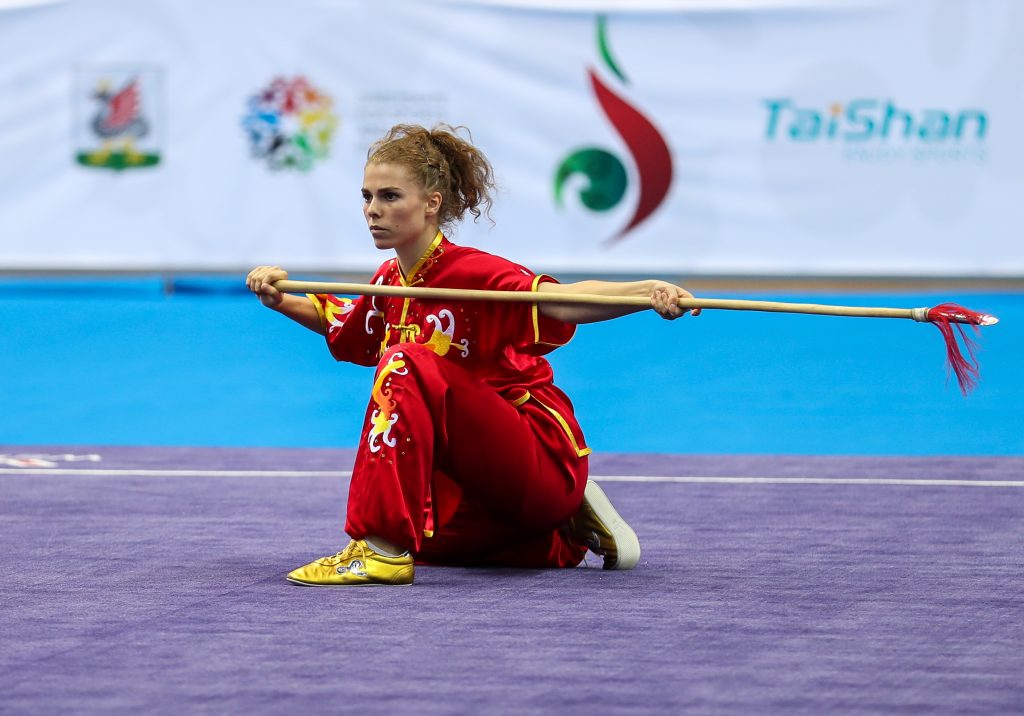
One competition built upon another, and Juliette began to love being part of her wushu team. As a young woman she looked up to the older athletes who took her under their wing. “In France,” she says, “there was a strong national collective with juniors and seniors, and team trainings over a week. I was only a cadet so I was really inspired by those athletes. We were always well represented in the European championships and could send a large team.”
Juliette’s graceful and precise wushu qualified her only a year later to debut internationally at the 12th World Wushu Championships in 2013 in Kuala Lumpur. It would be a life-changing event in many ways.
“I remember this competition well,” says Juliette. It was a huge experience! I was only 15 and traveling to the other side of the world with the national team made a huge impression on me. I had never slept in such a hotel, never visited countries with this heat, never undergone a doping test… It was thrilling!”
“I competed in changquan 3rd compulsory and jianshu optional. First was jianshu. I remember entering the competition area in front of the judges and carpet, and thinking: ‘What on earth am I doing here?’ It went ok, but I felt my taolu was a little clumsy. However, I was at the beginning of this international wushu journey!”
The World Wushu Championships dazzled the young French athlete who had never witnessed such elite sport performances. “I really discovered the top level wushu,” Juliette says. “I had watched some videos of course but seeing it live is totally different. What struck me the most was the sharpness of the movements – they were accurate and quick, and suddenly frozen in some stances. The rhythm and the contrast were crazy.”
Juliette would return to the 14 th World Wushu Championships in Kazan in 2017 to place 12 th in a highly competitive qiangshu category with a 9.09. A year later, she got the silver medal in spear at the European Championships in Moscow, a career milestone. “The European Championships was a great competition experience,” remembers Juliette. “I was really in a good mood and satisfied with my performance. Standing on the podium is thrilling, and especially when the competition is over, there is a strong feeling of achievement. Of course, when I watched the video I wanted to go back training to improve as soon as possible, but at the moment, there was only happiness and pride.”
Even so, something exciting would follow Juliettte’s medal when she went for a celebratory stroll in Moscow with her boyfriend. “Benoit Denolle,” she tells us, “also competing for the French national team, proposed in Red Square. We got married in summer 2021! He completes my best team: we keep cheering for each other and it really helped us keep training during the Covid lockdowns. He will also participate in this World Games, so we train together to be ready for this moment!”
For many wushu athletes, the experience of going to train in China, the birthplace of wushu, fulfills not only a sport dream but also inevitably sharpens one’s talent and can even lead to epiphanies. “I trained in China once,” says Juliette, “in the summer of 2019. It started when we contacted Peng Ao Feng on Instagram to ask him to come to France for two weeks in December 2018 to coach us. This first experience with Chinese culture was so awesome I even skipped school classes so that I could train more! It was like opening a new knowledge box. Peng Ao Feng is an amazing person who really loves expressing something through the practice of wushu. It was a good match and we went to China the next summer to train with him and his partners.”
“This experience was beyond words,” continues Juliette. “We stayed in Shanghai for one month and I totally discovered a new way of thinking and feeling wushu. We went through individual lessons. It also allowed me to create my changquan and qiangshu openings.”
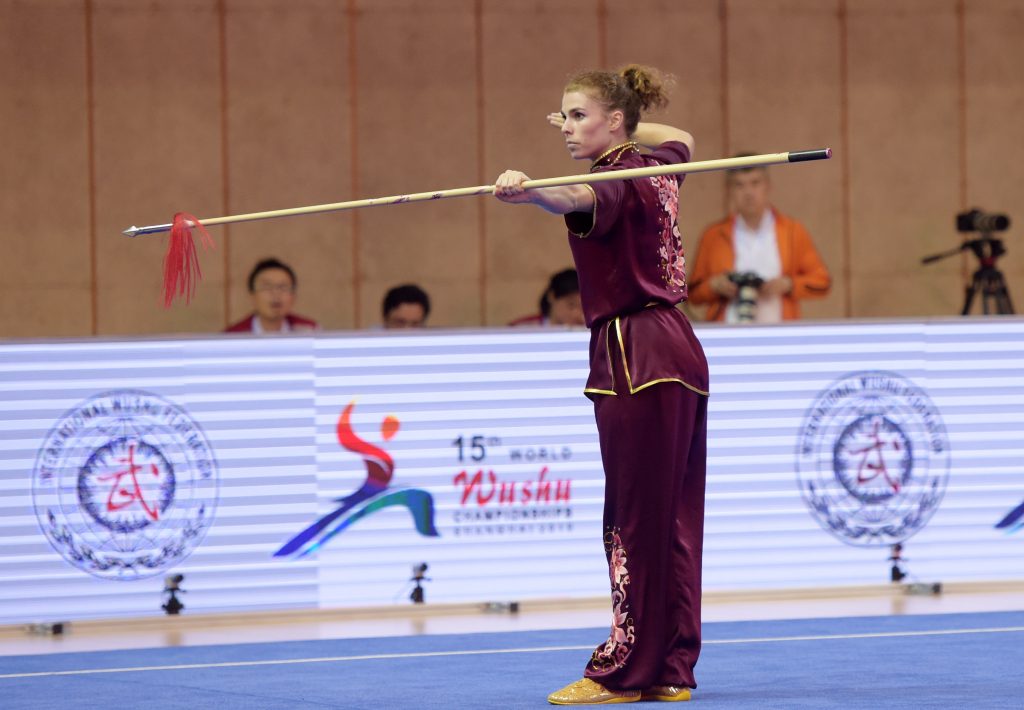
After reaching a new benchmark in wushu, Juliette was ready for China again – this time the 15 th World Wushu Championships in Shanghai. And she was in pursuit of a dream. “I was very tired arriving in Shanghai because of my school lessons at this time, it was a very tight schedule. Therefore, at the beginning of the competition it was hard because I felt my body and mind were still tired and recovering.”
“The opening ceremony was amazing, the most beautiful I have seen since my beginning of international competitions! The facilities were very nice too. It was a gorgeous championship.
I was very surprised and so happy when I discovered I ranked 8th in qiangshu. I liked my performance but top 8 was a dream. I hoped I could rank so that I could be selected for the Taolu World Cup. My coach said I did well so I was very proud. I was also satisfied with my changquan performance. I knew that Ao Feng and team came to cheer me on and that made me happy as well. After the competition we met again. I really have a good memory of this competition.”
One of the attributes that makes Juliette stand out at international competitions is her warm camaraderie, outgoing friendliness, and sportsmanship regarding her other competitors. She remarks that her friendships through wushu with both her French teammates and her international friends are an incredibly distinctive part of her life. “We share something really special when we’re competing together,” she says. “We keep in touch mainly on Instagram, reacting to each other’s training stories. I think we all care for each other and we feel concerned when athletes have challenges.”
“I feel particularly close to European wushu athletes,” she continues, “as we meet more often and we have already organized some training sessions together with athletes from Spain and Italy, for example. I talk to them regularly, but also to English, Ukrainian, Russian, Belgian, and Dutch athletes.
Moreover, even though they are further away, I bonded with other international wushu athletes from Indonesia, USA, Lebanon, Iran, India, Vietnam, and China. I’m sure I am forgetting some countries but they are all in my heart. Wushu is a wonderful sport in which anyone can express themself in different ways. I feel close to people who share my passion for this sport and I am glad to meet them again at international events.”
The French wushu team, especially, has become Juliette’s sport family. “We have approximately two national training week-ends per year,” she explains, “a bit more when there is an international competition. During those training sessions, the national coaches encourage us to support one another by yelling “Fàguó duì, jiayou!!”, especially when the youngsters are joining. We are dressed with France’s colors and move together as one group as we go out to eat and train.”
Although Juliette is still young at 24, her experience has helped her become a guiding member of the French team and she has taken on an unofficial leadership role. “Last training session together,” she says, “I was the ‘oldest’ and the team called me Big Sis. I had responsibility to make sure everyone was fine. It was so weird because in my head I always was the youngest just as when I started competing! However, our team is well organized and well supported, and we are lucky to be taken care of and well accompanied in traveling and training. It is reassuring as an athlete.”
Juliette’s specialties are qiangshu and jianshu, and despite not yet winning a gold medal at a top international event, her popularity with audiences is evident. While she may not always score perfect technical marks, her creative expression lights up the carpet and she uses her wushu to express feelings and soul. She explains why she particularly is drawn to spear and straight sword. “I especially like the diversity of movements we can find in those specialties,” she says. “Also, I really appreciate the wideness and feeling that can be expressed with them. To me, they arouse more emotion than others.
I don’t know if they suit me well but I really love practicing them. Alternately, I am not very comfortable with daoshu and gunshu movements around the head. However, I like the power I can express in changquan. Practicing barehand is very interesting as you are not distracted by any weapon, you can focus on the right move, from the feet to the tip of the fingers.”
Emotion and feeling are, for Juliette, inseparable from wushu during competition and training. “Every moment is special,” she says, “but I especially like sharing the experience you can have with other athletes. It first happens during warm up where you can show off a bit, then in the corridors before entering the arena while supporting one another and finally after the competition when athletes relax and have more time to share moments. You can be either satisfied or not with your performance, but this special atmosphere remains.”
“Of course,” she continues, “individually, this feeling you have when you leave the carpet after performing well is hard to describe. It is an achievement. Your heart is light and your head is dizzy.
I have had plenty of wonderful experiences in wushu, but I couldn’t describe them all. One of them is definitely meeting with Peng Ao Feng and training in China, opening to me a totally new way of feeling wushu. The 15th World Championships in Shanghai was amazing too. Finally, I had my best performance this year during national competitions (French Open and French Championship).
Moreover, wushu brings me joy in my everyday life – there are those awesome national and international events, but in addition there are every day’s little challenges and team support, sharing with other athletes and training with my team in Bordeaux that brings me happiness.”
While wushu brings her great joy, Juliette is still an athlete in her prime, and she remains hungry for bigger success in her sport. She acknowledges that she has had, and still has, challenges. “One of my first big challenges,” she notes, “had been reaching the 540 rotation and landing. One of my former coaches once told me that girls in France cannot reach 540. So I tried harder. And once you succeed a few times, you still have to work to make it consistent. One of my everyday life challenges now is to improve my sword flowers’ speed. Another challenge is the rhythm of the taolu. I didn’t train a lot in China, and thus I had no time to “feel the beat” a lot. To understand the “shenfa” and those internal notions of kinetic energy to achieve the right move and adapt the rhythm. I am still working on this!”
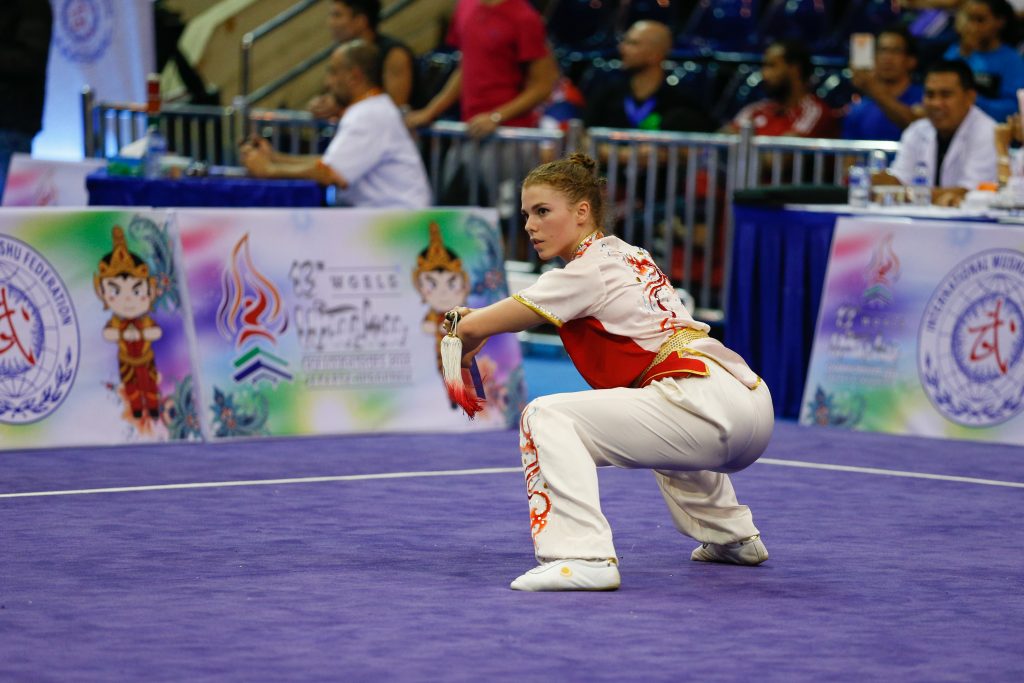
A philosophical outlook remains central to Juliette’s wushu evolution. She says reflectively, “Wushu is a never ending story – there are so many challenges! You have to find the movement that suits you, learn and adapt complex movements and notions. Every time you pass a milestone, you can enjoy a bit before looking again at the abyss of things you need to work on.”
Along with support from her teammates and family, Juliette’s coaches have helped her wushu develop over the past 18 years. “I recently asked myself, “she says, “what percentage of influence I could attribute to each of my coaches. Turns out it was not an easy task to do! My first wushu teacher (Philippe Schmidt) taught me strong basics and fundamentals. His students then were my coaches and we worked on superficial details, they introduced me to competition. At this step, I had never really left my club.”
“Then I attended training sessions with a former Chinese athlete living in France named Houlin and trained with French international athletes during national seminars. This was the opportunity to go beyond my limits: go faster and stronger. I was integrating into the competitive wushu sphere.
Recently, thanks to meeting Peng Ao Feng and training in France with a great former wushu player, who both specialized in jianshu and qiangshu, I reached another level of feeling and understanding of wushu. I was seeking for the right move and expressing myself in my taolu.”
Bordeaux may be the capitol of wine, but as Juliette mentioned earlier, wushu has a slim presence there. Alongside her day job, Juliette and her husband work assiduously to promote the wushu, teaching in their club and around the city. She does not have world champion coaches to correct her technique every day in training, or push her to her limits. So to improve, she must be creative and work harder. “I have no daily coaching,” she notes, “and together with Benoit, we are the club teachers. So I use video a lot and I try to join virtual training sessions with other coaches as much as possible. Every step is meaningful and I liked discovering all of them!”
Juliette continues, “My family is really proud and they appreciate seeing me grow with this sport. They support me a lot and I cannot thank them enough for that. When I lived with my parents, they paid attention to the food I preferred before and after trainings, and my parents and grandparents often took me to practice. They always set the alarm clock late in the night when I’m competing abroad so that they can watch and remotely cheer me on! I was able to call them after my jianshu and qiangshu events in Shanghai. It is my family and friends who support me every day and contribute to making this journey possible!”
In life outside of wushu, Juliette recently graduated from ENSC (École Nationale Supérieure de Cognitique) and is now a human factor engineer, responsible for UX design and user centered approach in a French SME called Immersion, which proposes innovative VR, AR and collaborative solutions to answer issues of customers. “It is very interesting,” she says, “as I have the opportunity to work in research projects related to sport, skill transmission, and industry. I had to learn how to manage work and personal life be able to lead this dual professional and sportive project. But I like to say that if I want to do something, I surely can do it!”
What are Juliette’s future goals in wushu? She replies emphatically, “I will definitely still be involved in wushu after retiring from competition! However, I do not plan to stop competing yet. I still want to progress and I have some goals remaining I want to achieve, specifically 1st place at a European Championship, and a good performance at the World Cup. I currently teach wushu to children weekly and adults occasionally, and this is not going to stop. Even more, I’ll have more time to focus on promoting wushu more after retiring from competitions. I think we also have some issues to face in France to create a strong and united wushu collective.”
“Wushu is a lifetime journey!” Juliette exclaims. “Competition is a big part of it but I’d like to focus on teaching, learning new kung-fu wushu styles, and attending artistic projects. I also want to develop a program for para wushu for the disabled. It is a project I really want to materialize, probably after retirement from competing. The idea would be to propose wushu lessons for partially sighted and deaf people, exploring new ways of transmission. Indeed, wushu practice requires balance skills and complex movements that are facilitated by sight and hearing. However, an important part of wushu targets a coherence and internal feeling: your strength comes from your feet, you need to be powerful and relaxed at the same time by contracting the good muscles. Explaining wushu in different ways and making it more accessible for all is to me interesting and important. Once, I saw a partially sighted competitor in nationals and I was very touched to see her confidence in being able to present her form. I have already tried to perform my 4th section with closed eyes, and it’s completely different! I was lost and hesitating, but inside the feeling was increased.”
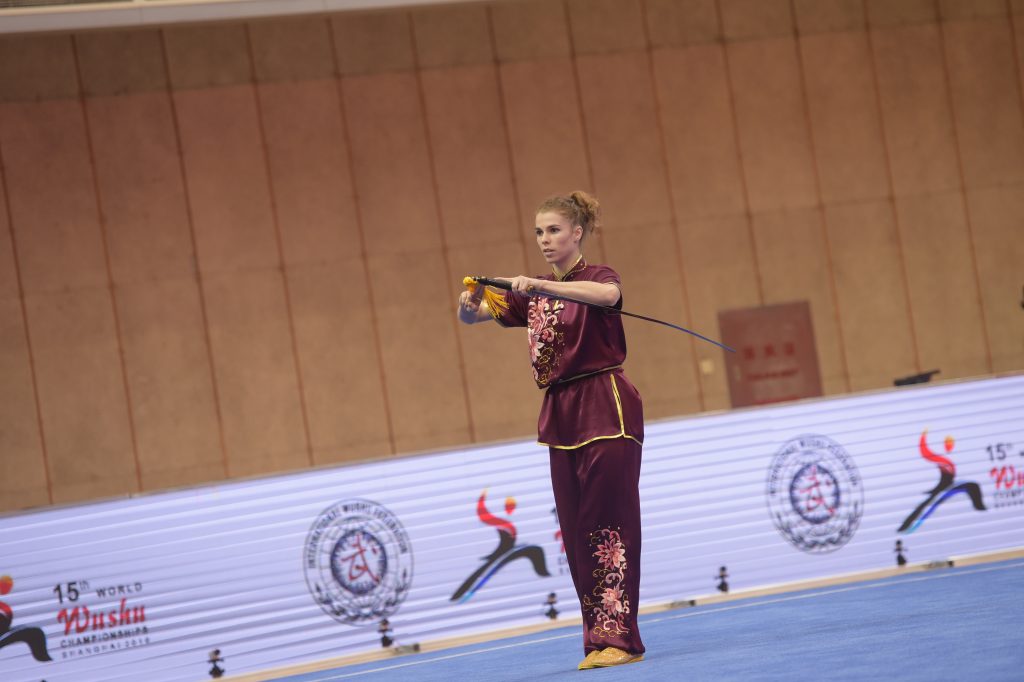
Juliette will come to The World Games in Birmingham this summer to compete in changquan. Her husband, Benoit Denolle, will also compete in the Games, in men’s jianshu & qiangshu all around. And her nation will be looking for Juliette to make French wushu history as the first female athlete from their nation to bring the sport to this elite international stage.
“I am very excited to get back on the international stage at such a competition!” says Juliette. “I am proud to represent my country and to have the opportunity to face so many amazing athletes. International championships made me grow, and since training in China, and during the covid pandemic, my practice has evolved. This time I will only compete in changquan and my goal is to do my best performance ever, to walk off the carpet with no regrets and this feeling of achievement. It is the first time I will compete in only one event, and thus it is a different approach with no room for mistakes, but also more time to prepare for it.”
Juliette concludes, “This is a new opportunity to express myself and share with other athletes. Besides, we do not know what tomorrow is made of, and even though I really hope I could go to the World Cup and next World Championships, I will fully enjoy this moment at the World Games and I will not lose a moment of it!”








